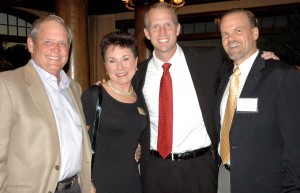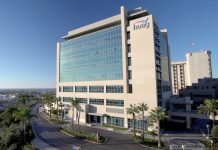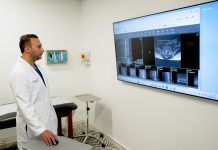
“The best solutions for poverty come from the poor themselves,” Peter Greer said at the recent HOPE International celebration at Big Canyon Country Club. “HOPE exists so that people can dream again.”
Greer is the president and CEO of HOPE International, a Christian faith-based 501 (c)(3) nonprofit organization focused on alleviating physical and spiritual poverty through microenterprise development. HOPE provides discipleship, biblically based business training, a safe place to save, and small loans that restore dignity and break the cycle of poverty.
The stated mission of HOPE International is: “To invest in the dreams of the poor as we proclaim and live the Gospel in the world’s underserved communities.”
Deborah Anderson, a Newport Beach resident and the regional board chair and event chair, welcomed the 250 men and women to the first annual “Investing in Dreams” event.
“Our prayer is that by the end of this evening you will partner with us to provide more than $250,000 to ‘Fund a Dream’ to help men and women in developing countries start their own businesses,” she said.
“It’s been a fun journey to see how HOPE has grown to now serving over 580,000 clients in 17 countries around the world,” said Jenn Tarbell, HOPE’s Orange County senior regional representative. “Having just returned from a visit to Rwanda, I can attest to the significant impact Christ-centered microfinance has on those we serve. It’s an impact that is multiplied as it affects not just our clients but their families and their communities as well.”
Tarbell then introduced Greer.
“Peter has humbly and boldly led HOPE for over eight years,” she said. “He leads with a servant’s heart and is an example not only to our clients and partners around the world and to us internally as HOPE employees, but to those on the outside looking in.”
Greer spoke about HOPE’s proven and sustainable method of helping those in poverty without inadvertently causing them harm along the way. He expanded on important points from “Toxic Charity,” a book by Robert Lupton about the levels of dependency that often result from giving handouts.
“The response starts with gratitude; and with the second hand out the response is anticipation; the third generates expectation; the forth entitlement; and by the fifth time – codependency,” Greer explained.
“Instead of offering handouts,” Greer continued, “HOPE breaks this cycle by empowering entrepreneurs to provide those things for their own families and communities.”
The theme of the evening revolved around dreams: the significance of dreaming, the importance of having dreams, goals and visions in life, as well as the unique fundraising opportunities HOPE refers to as “Fund A Dream.”
“We believe that every single individual on the planet has dreams, gifts, talents and ideas, and may just lack the capital and the opportunity to put those things into play, or to expand on their efforts,” Tarbell said.
HOPE typically provides small loans ranging from $100 to $2,000. The capital is enough to develop a small business to help a family meet their needs including food, schooling, and housing. From inception to present, HOPE has a loan repayment rate of 96 percent.
It was an evening filled with powerful stories about changed lives. The money raised has the potential to change many more by funding up to 1,000 businesses, thereby helping entrepreneurs around the world support their families and invest in their communities.
”It was an amazing evening and we were blessed beyond our prayers,” said Anderson. “We exceeded our goal of funding $250,000 in investing in dreams.”
For further information, go to hopeinternational.org
Cindy can be reached at cindy@onthegrow.com.




